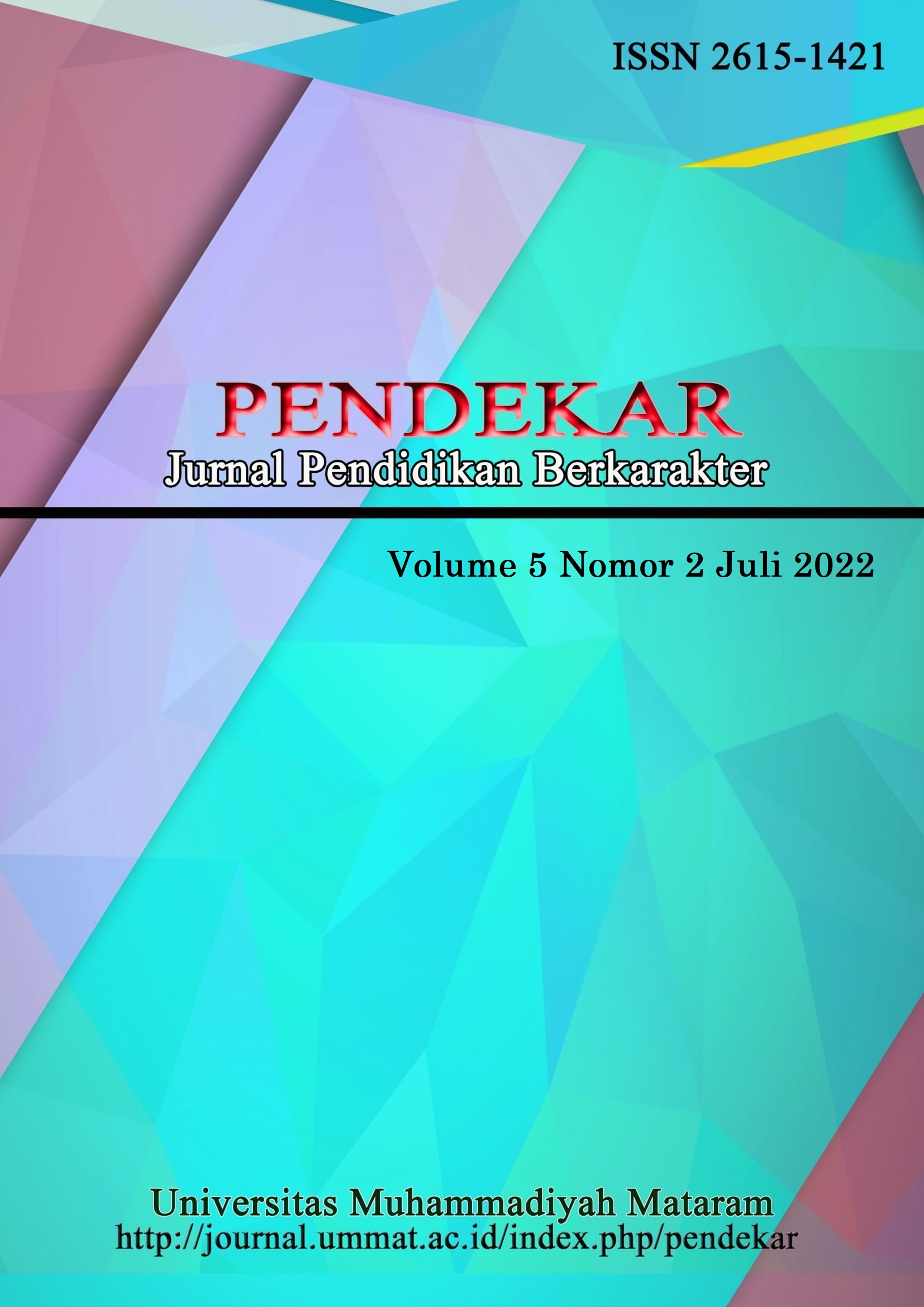KETIDAKEFEKTIFAN KALIMAT PADA LATAR BELAKANG SKRIPSI PROGRAM STUDI PENDIDIKAN BAHASA INDONESIA STKIP MUHAMMADIYAH SUNGAI PENUH
DOI:
https://doi.org/10.31764/pendekar.v5i2.9719Keywords:
Ketidakefektifan, Kalimat, Latar belakang, Skripsi.Abstract
Abstrak: Tujuan penelitian ini adalah untuk mendeskripsikan kesalahan penggunaan kalimat efektif pada latar belakang skripsi mahasiswa Program Studi Pendidikan Bahasa Indonesia Tahun 2017. Jenis penelitian yang digunakan dalam penelitian ini adalah jenis penelitian kualitatif dengan metode deskriptif. Data penelitian adalah kalimat tidak efektif yang ditemukan dalam latar belakang skripsi mahasiswa STKIP Muhammadiyah Sungai Penuh. Teknik pengumpulan data adalah teknik baca dan catat. Teknik analisis data adalah membaca dan menandai, mengiventarisasi, mengklasifikasikan, menganalisis, melakukan pembahasan dan penyimpulan hasil penelitian. Hasil penelitian menunjukkan bahwa terdapat ketidakefektifan kalimat dalam latar belakang skripsi mahasiswa STKIP Muhammadiyah Sungai Penuh dalam hal kesepadanan struktur, kehematan, keparalelan, kelogisan, ketegasan, ketepatan, dan keringkasan.
Abstract: The aim of this research was to describe the errors made by Bahasa Indonesia Study Program students’ academic year 2007 in using effective sentences on their thesis background. This research is a qualitative research with descriptive method. Data of this research were ineffective sentence found in the students of STKIP Muhammadiyah Sungai Penuh thesis background. Techniques of collecting the data used by the researcher were reading and taking note. The data analysis was done by reading and marking, taking inventory, classifying, analyzing, discussing and concluding the research result. The result of this research showed that there were ineffective sentences in the students of STKIP Muhammadiyah Sungai Penuh thesis background in terms of structural equivalence, frugality, parallelism, logicalness, firmness, accuracy, and conciseness.
References
Chaer, A. (2009). Ragam Bahasa Indonesia. PT Rineka Cipta.
Dalman. (2015). Menulis Karya Ilmiah. Rajawati Pers.
Darmono dan Hasan. (2002). Menyelesaikan Skripsi dalam Satu Semester. Grasindo.
Sugono, D. (2009). Mahir Berbahasa Indonesia dengan Benar. Renika Cipta.
Wijayanti, S. H. dkk. (2013). Bahasa Indonesia Penulisan dan Penyajian Karya Ilmiah. PT. RajaGrafindo Persada.
Yulianti, Upit, D. (2020). Ketidakefektifan Kalimat Pada Skripsi Mahasiswa Program Studi Pendidikan Bahasa dan Sastra Indonesia STKIP PGRI Sumatra Barat.
Jehamin, E. O. (2019). Analisis Ketidakefektifan Penggunaan Kalimat Pada Abstrak Skripsi Mahasiswa Program Studi Pendidikan Sejarah Universitas Sanata DharmaLulusan Tahun 2017.
Prastowo, A. (2016). Metode Penelitian Kualitatif Dalam Perspektif Rancangan Penelitian. Ar-Ruzz Media.
Setia.
Sugono, D. (2009). Mahir Berbahasa Indonesia dengan Benar. Renika Cipta.
Wijayanti, S. H. dkk. (2013). Bahasa Indonesia Penulisan dan Penyajian Karya Ilmiah. PT. RajaGrafindo Persada.
Yulianti, Upit, D. (2020). Ketidakefektifan Kalimat Pada Skripsi Mahasiswa Program Studi Pendidikan Bahasa dan Sastra Indonesia STKIP PGRI Sumatra Barat.
Downloads
Published
Issue
Section
License
Authors who publish articles in International Journal on Student Research in Education, Science, and Technology agree to the following terms:
- Authors retain copyright of the article and grant the journal right of first publication with the work simultaneously licensed under a CC-BY-SA or The Creative Commons Attribution–ShareAlike License.
- Authors are able to enter into separate, additional contractual arrangements for the non-exclusive distribution of the journal's published version of the work (e.g., post it to an institutional repository or publish it in a book), with an acknowledgment of its initial publication in this journal.
- Authors are permitted and encouraged to post their work online (e.g., in institutional repositories or on their website) prior to and during the submission process, as it can lead to productive exchanges, as well as earlier and greater citation of published work (See The Effect of Open Access).

